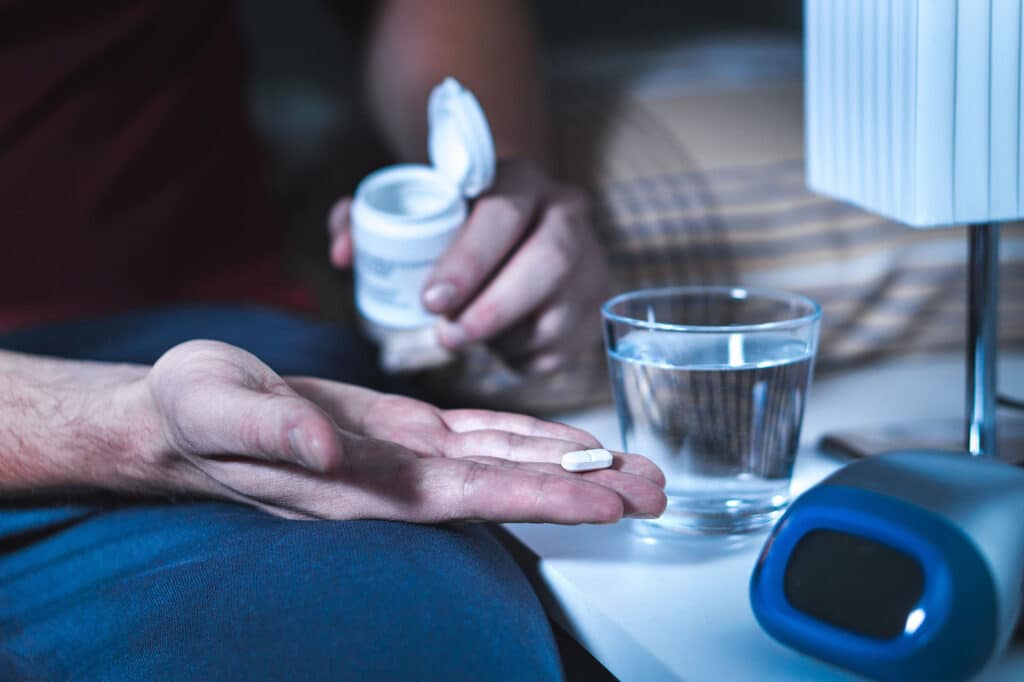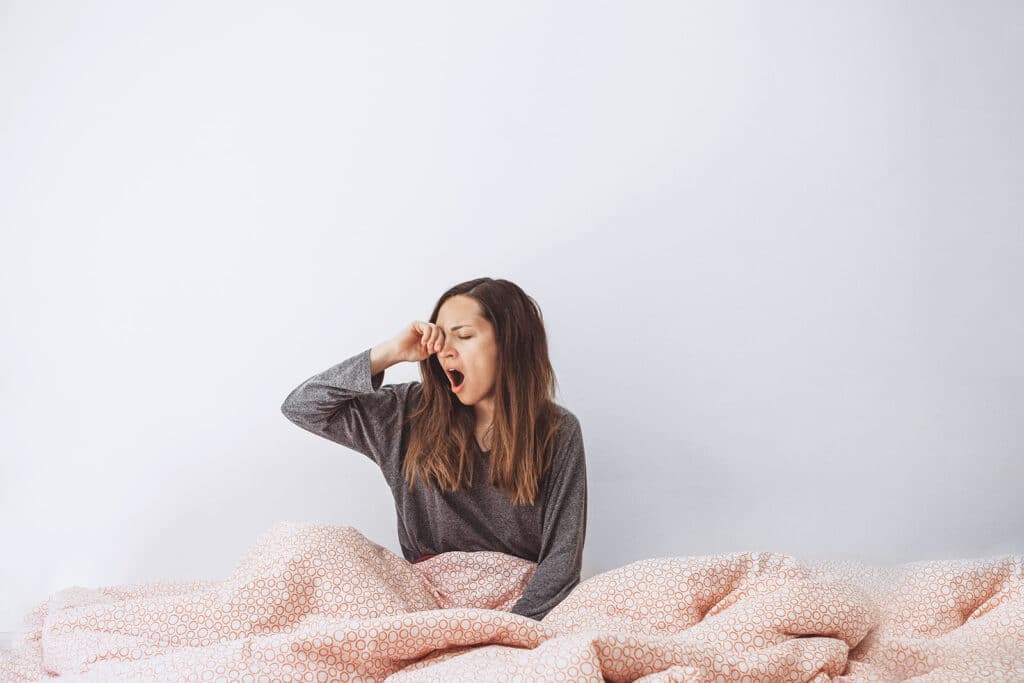Sleeping pills may be prescription or non-prescription substances. Today, they are becoming more common among adults of all ages. In some cases, people become dependent on them for sleep, and misusing sleeping pills can be dangerous. It is important to understand how they work, common side effects, why they are problematic and what the overdose risks are.
Table of Contents
- What Are Sleeping Pills?
- Why Are Sleeping Pills So Prevalent in Today’s Society?
- How Long Do Sleeping Pills Take To Kick In?
- Can You Overdose on Sleeping Pills?
- What Happens if You Overdose on Sleeping Pills?
- Can You Overdose on Melatonin?
- What Are the Side Effects of Sleeping Pills?
- Which Sleeping Pill Is Most Dangerous?
- Sleeping Pill Addiction and Overdose Treatment
What Are Sleeping Pills?
There are several types of pills that are sleep aids. For prescription sleeping pills, the drugs typically prescribed are hypnotics, tranquilizers or sedatives.[1] They either cause drowsiness or affect an area of the brain that is responsible for alertness. Ambien and Lunesta are two common sedative-hypnotic prescription sleeping pills. Some doctors may also recommend various antidepressants or benzodiazepines.

Some common over-the-counter sleep aids people use are Benadryl, Unisom, melatonin or valerian.[2] Benadryl and Unisom are both antihistamines with sedative effects. The drugs are commonly used for allergy relief. Valerian is an herbal supplement that makes some people feel sleepier.[2] Melatonin is a hormone that helps balance waking and sleeping. It tends to have mild effects and is often recommended to relieve jet lag.[2]
Why Are Sleeping Pills So Prevalent in Today’s Society?
In one study of nearly 650 adults, 19% regularly used prescription sleep aids.[3] One year later, almost 70% of those individuals still used sleep aids. While sleep aids are not meant to be long-term solutions, many people use them regularly anyway. There are plenty of potential contributors to the growing use of sleeping pills or sleep aids. Prescription sleeping pills are often given to people with insomnia.[1] Stress is a leading cause of insomnia.[4] These are some examples of stressors that may temporarily affect sleep:
- Job loss
- Death of a loved one
- Major life change
- Illness
- Noise
- Extreme temperatures
Some of these stressors are inevitable. However, people who face stress continually may be more likely to misuse sleep aids.[3] Also, people with underlying mental health needs that are unmet may be more likely to misuse sleep aids or other substances.[5] Some mental health disorders come with insomnia or sleep disturbances. This may be another contributor since at least 25% of the population has a mental health issue.[6] About 45% of those who have a mental illness do not receive professional treatment for it.[7]
How Long Do Sleeping Pills Take To Kick In?
The time sleeping pills take to work depends on the person and the type of sleep aid. For example, melatonin often takes between 30 and 60 minutes to make someone fall asleep.[8] Ambien usually works within about 30 minutes, and most people see an improvement in sleep within a week.[8] With many sleeping pills, the substances help people fall asleep between eight and 10 minutes faster than most people.[1]

Can You Overdose on Sleeping Pills?
Yes, you can overdose on sleeping pills; taking more than the recommended dose is possible and potentially dangerous. Medications can affect people differently, which is why it is important to discuss the possible effects of any OTC or prescription sleep aid with a doctor before taking it. Also, some sleep aids may interact with other medications and cause adverse effects. If a doctor prescribes a non-OTC sleep aid, it is important to follow the dose instructions precisely.
What Happens if You Overdose on Sleeping Pills?
The specific dangers of overdosing on any OTC or prescription sleep aid depend on the substance and its actions. Even OTC sleep aids can be dangerous when taken in high doses.
OTC Antihistamine Overdose Symptoms
Both Unisom and Benadryl that people often take to aid in sleep are first-generation antihistamines, which are known to have more potential dangers than second-generation drugs.[9] These are some common symptoms of an antihistamine overdose:
- Blurred vision
- Extreme drowsiness
- Vomiting or nausea
- Elevated heart rate
- Poor coordination
- Confusion
- Seizures
- Coma
If a person who is taking antihistamines for sleep is unconscious or having a seizure, call 911. These are both serious complications.
Prescription Sleep Aid Overdose Symptoms
Since the medications prescribed to help people sleep are usually tranquilizers and sedatives, brain function and voluntary functions become slower.[10] The effects of a sleeping pill overdose may look similar to an alcohol overdose. These are some possible symptoms:
- Slurred speech
- Bluish-tinted lips, skin or fingers
- Dizziness
- Fainting
- Poor coordination
- Slowed heartbeat or breathing
- Nausea or vomiting
- Cold-to-the-touch skin
- Difficulty responding or thinking
- Difficulty breathing
- Shock
- Coma
- Unconsciousness
If you see someone who is taking sleeping pills demonstrating signs of an overdose, call 911. Even if the person is talking, slowed heartbeat and breathing can be especially dangerous.[10] It is possible for people who take too many sleeping pills and do not receive medical treatment to die.
Can You Overdose on Melatonin?
Yes, you can overdose on melatonin. While it may not produce the same dangerous effects that antihistamines or prescription sleep aids can, it may produce other effects. Since there is no official standard on melatonin dosing, it is difficult to define an overdose.[11] For example, some packages may recommend taking one tablet, and others may recommend taking two. However, taking more than what is recommended on the packaging can be an overdose. If you take large amounts of melatonin, it may disrupt your sleep cycle.[11] Additionally, it can cause more pronounced side effects, which will be discussed more in the next section.

What Are the Side Effects of Sleeping Pills?
Sleeping pill side effects depend on the specific medication and its actions. These sections cover a few common side effects.
OTC Sleeping Pill Side Effects
Some common side effects of OTC antihistamines are constipation, drowsiness, UTIs and dry mouth.[2] Both melatonin and valerian, which are also OTC substances, may cause headaches for some people. Additional possible side effects of melatonin include daytime sleepiness, reduced blood coagulation and a lower body temperature.[12] In people who take other prescription sleep aids, melatonin may also interact with some medications. For example, it worsened the side effects of Ambien for some people who took the two substances together.[12]
Prescription Sleeping Pill Side Effects
Since there are several types of sedatives, hypnotics and tranquilizers that are prescribed to treat sleep problems, some medications have their own potential side effects. For example, some possible side effects of Ambien are uncontrollable shaking, chest pain, rash, difficulty breathing and sleep walking.[8] For any prescription sleep aid, be sure to read and understand all the potential side effects. There are some common side effects that apply to most types of prescription sleeping pills.[2] These are some examples:
- Headaches
- Lightheadedness or dizziness
- Constipation or diarrhea
- Nausea
- Lasting drowsiness
- Sleepwalking
- Changes in thinking
- Agitation
- Hallucinations
- Memory problems
- Suicidal thoughts
With antidepressants that are prescribed to aid with sleep, there may also be weight changes or irregular heartbeat.[2]
Which Sleeping Pill Is Most Dangerous?
All prescription sleeping pills have the potential to be highly dangerous for some people. Although even antihistamines can be dangerous in a few cases, the biggest dangers are with prescription medications that come with a risk of dependence and addiction. Dependence happens when the person’s body is chemically dependent on the substance.[13] If a person cannot stop using the substance, that means the individual is addicted. There are several medications prescribed as sleep aids that have a higher risk of dependence and abuse, which makes them potentially more dangerous.[2] These are some sleeping pills with a high risk of abuse:
- Dayvigo
- Quviviq
- Lunesta
- Ambien
- Halcion
- Sonata
- Ambien and Ambien CR
- Belsomra
- Restoril
- ZolpiMist
- Edluar

Sleeping Pill Addiction and Overdose Treatment
If you or someone you know is addicted to or taking too many sleeping pills, help is available. Addiction treatment is designed to help people learn the causes of behaviors or triggers and how to beat addiction. Behavioral therapy may also help improve sleep problems. Since many people who misuse prescription medications have a mental health condition that is untreated or treated insufficiently, dual diagnosis treatment for the issue and addiction may also help.
Detox, dual diagnosis treatment, outpatient treatment and inpatient programs are available to suit varying needs. Let the professionals at Illinois Recovery Center help you start on the path to recovery. Please. Contact us to learn more about sleeping pill addiction treatment.
FAQ
What happens when you overdose on sleeping pills?
What happens if you take too many sleeping pills?
Can you overdose on melatonin?
Can you overdose on over the counter sleeping pills?
References
[1] https://my.clevelandclinic.org/health/drugs/15308-sleeping-pills
[2] https://www.mayoclinic.org/healthy-lifestyle/adult-health/in-depth/sleep-aids/art-20047860
[3] https://www.ncbi.nlm.nih.gov/pmc/articles/PMC4791616/
[4] https://my.clevelandclinic.org/health/articles/11429-common-sleep-disorders
[5] https://nida.nih.gov/publications/research-reports/common-comorbidities-substance-use-disorders/part-1-connection-between-substance-use-disorders-mental-illness
[6] https://www.hopkinsmedicine.org/health/wellness-and-prevention/mental-health-disorder-statistics
[7] https://www.forbes.com/sites/michaeltnietzel/2021/05/24/why-so-many-americans-do-not-seek-professional-help-for-mental-disorders/?sh=131d8d6f3de7
[8] https://www.pennmedicine.org/updates/blogs/health-and-wellness/2018/july/sleeping-aids
[9] https://www.healthline.com/health/antihistamine-overdose#symptoms
[10] https://www.verywellmind.com/the-danger-of-sedative-overdose-66578
[11] https://www.healthline.com/health/melatonin-overdose
[12] https://www.healthline.com/nutrition/melatonin-side-effects#TOC_TITLE_HDR_6



